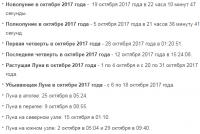The form of the order on the provision of additional days off. Work at the weekend: we make out correctly
Work on weekends and non-working holidays >>>
Types of compensation for work on weekends and non-working holidays \u003e\u003e\u003e
GENERAL ACCEPTED DAYS
1. Weekends and non-working holidays \u003e\u003e\u003e
2. Common weekend \u003e\u003e\u003e
3. Days off in the organization \u003e\u003e\u003e
4. Additional days off \u003e\u003e\u003e
5. Weekends of employees on business trips \u003e\u003e\u003e
7. Accounting of days off and additional days off \u003e\u003e\u003e
1. Weekends and public holidays
Weekends - days off from work, which are provided to the employee for a weekly uninterrupted rest in accordance with paragraph 5 of Art. 37 of the Constitution of the Russian Federation.
Non-working holidays - days off from work, established by legislation for all workers regardless of the organizational-legal form of the employing organization.
In order to regulate labor relations, including the creation of favorable conditions for rest, labor legislation, regardless of the type of employment contract, work experience and other conditions, establishes a list of types of rest periods, which, in addition to weekends and holidays, include:
Breaks during the working day (shift);
Daily (inter-shift) rest;
2. Common weekend
In the Russian Federation, the general day off is Sunday. At five days working week second weekend is set either collective agreementor the rules of internal labor regulations (hereinafter referred to as PTP). The norms of the Labor Code of the Russian Federation provide for the possibility of providing two days off in a row.
If the company has a six-day working week, then there is only one day off (part 1 of article 111 of the LC RF).
The day off may not coincide with the general day off (Sunday) and may be provided on other days of the week. This possibility is provided if a single day of rest for all employees of an enterprise can disrupt the production process or work organization. In this case, PTP sets the priority for providing weekly rest for different groups of workers on different days of the week.
In order to make rational use by workers of weekends and non-working holidays, the Government of the Russian Federation may postpone weekends to other days (part 5 of article 112 of the Labor Code of the Russian Federation).
Work on weekends is prohibited. An exception is provided for the cases established by Art. 113 of the Labor Code of the Russian Federation.
3. Days off in the organization
Weekends for a particular organization, depending on the needs or specifics of production, are established in the PTP (Part 3 of Art. 111 of the Labor Code of the Russian Federation), for individual employees - in the employment contract.
The duration of uninterrupted rest, as provided for by PVTR, cannot be less than 42 hours (articles 110, 111 of the Labor Code of the Russian Federation). It is calculated from the time of the end of work on the eve of the day off before the start of work (shift) in the next working day after the weekend.
With a cumulative record of working time, the duration of a weekly uninterrupted rest may be less than 42 hours. The specific duration of such rest for employees of railway, road and water transport and other industries is established by the provisions on working time and rest time in these industries (Clauses 22, 23 of the Regulation on the specifics of working hours and rest time for employees of inland navigation vessels, approved by the Order of the Ministry of Transport of the Russian Federation of May 16, 2003 No. 133, paragraph 9 of the Regulation on the specifics of working hours and rest time of communications workers with a special nature of work, REPRESENTATIONS Order of the Ministry of Communications and Informatization of 08.09.2003 N 112 and other acts). In any case, during the reference period, the duration of the weekly uninterrupted rest must be at least 42 hours.
The employer needs to pay attention to the fact that PTPs should contain items relating to any rest time, including weekends. This document should indicate which specific days are holidays. If the organization has different working hours, then for each of the categories of workers, the conditions for holidays are determined separately. For example, during the five-day work week, weekends are set Saturday and Sunday, while shift work - according to the schedule, with weekends may occur on Tuesday, Thursday and another day.
PTP are approved by an official or by an order (instruction) of the head (or authorized person) (clause 3.16 of the Gosstandard of the Russian Federation of 03.03.2003 N 65-st "On the adoption and implementation of the state standard of the Russian Federation"). Before approval, the project is sent to an elected body of the primary trade union organization (if available), representing the interests of all or the majority of workers (part 1 of article 372 of the Labor Code of the Russian Federation).
It must be remembered that employees should be familiarized with PVTR against signing before signing an employment contract (part 3 of article 68 of the Labor Code of the Russian Federation).
If the mode of the employee’s rest time differs from the general rules in force with the employer (Article 57 of the Labor Code of the Russian Federation), the rest time may be provided as a mandatory condition for inclusion in the employment contract.
One of the parents (guardian, caregiver, adoptive parent), working in the Far North and equivalent areas and having a child under the age of 16 years. Such an employee is given one additional day off per month without pay (Article 319 of the Labor Code of the Russian Federation).
The basis for the execution of the order for the provision of an additional day off is the employee’s application in writing. The order is issued in the form that the employer develops independently. It should contain the surname, name, patronymic and position of the employee, the date of granting the day off, the reason for which it is provided, and also indicate whether this day is paid or not. With the order it is necessary to familiarize the employee under the signature. In case of refusal to sign, the employer must draw up a corresponding act.
1.1. Professional holidays, memorial dates \u003e\u003e\u003e
2. Transfer of non-working holidays \u003e\u003e\u003e
3. Accounting for public holidays \u003e\u003e\u003e
4. Payment of non-working holidays \u003e\u003e\u003e
1. Non-working holidays
The list of non-working holidays is set by Art. 112 of the Labor Code of the Russian Federation. It includes:
Currently in the Russian Federation are established:
1) Professional holidays:
2) Memorable days:
The situation of practice. Is a professional holiday set - Accountant Day?
There is no professional holiday in the Russian Federation - Accountant Day.
4. Payment of non-working holidays
Employees who receive an official salary, payment of non-working holidays is not provided. They are paid a full salary for the established standard of working time established for this category of workers. The presence in the calendar month of non-working holidays is not a reason for the reduction of wages (part 4 of article 112 of the Labor Code of the Russian Federation). In other words, these employees are saved. wage in full, regardless of the number of non-working holidays in the month.
With a different wage system (for example, piece-rate wage), employees for non-working holidays, in which they were not involved in work, are paid additional remuneration. Its size and payment procedure are determined by collective or labor contracts, agreements, a local regulatory act (part 3 of article 112 of the LC RF). This remuneration refers to the cost of labor in full.
WORK ON WEEKEND AND UNABLE CELEBRATION DAYS
1. Work on weekends and non-working holidays \u003e\u003e\u003e
2. Categories of workers who can not be brought to work on weekends and non-working holidays \u003e\u003e\u003e
3. Establishment of the order of work during non-working holidays \u003e\u003e\u003e
4. Involvement of workers to work on weekends and non-working holidays with their consent \u003e\u003e\u003e
5. Attracting employees to work on weekends and non-working holidays without their consent \u003e\u003e\u003e
6. Execution of the order on attracting employees to work on weekends and non-working holidays \u003e\u003e\u003e
7. Accounting of working hours on weekends and non-working holidays \u003e\u003e\u003e
1. Work on weekends and non-working holidays
By general rule, established by Part 1 of Art. 113 of the Labor Code of the Russian Federation, work on weekends and non-working holidays is prohibited, with the exception of cases when employees are attracted to work on those days provided for by this article (with the consent and without the consent of employees).
It is forbidden to involve in work on weekends and non-working holidays:
2) workers under the age of 18 years (Article 268 of the Labor Code of the Russian Federation), with the exception of:
Creative workers of the media, film organizations, television and video crews, theaters, theater and concert organizations, circuses and other persons involved in the creation and (or) performance (exhibiting) of works (List Code of the Russian Federation, approved by the Decree of the Government of the Russian Federation of 28.04 .2007 N 252);
Athletes under the age of 18. The conditions of their work on weekends and non-working holidays are determined by collective or labor contracts, agreements, local regulatory acts (part 3 of article 348.8 of the Labor Code of the Russian Federation).
3. Establishment of the order of work during non-working holidays
Internal Labor Regulations (hereinafter referred to as PTP) or employment contract Such a mode of working time and rest may be provided, during which work is also carried out on generally accepted weekends and non-working holidays. As a rule, this mode is set during shift work.
If, in accordance with the working time regime, the work is performed on a generally accepted day off, then it is not required to request the consent of the employee in this case.
The rule on increased pay for actual work during non-working holidays should be applied when calculating overtime hours after the end of the accounting period. This is due to the fact that work on holidays, performed in excess of the working time norm, should not be taken into account, since it has already been paid in double.
In addition to the cases established by Part 6 of Art. 113 of the Labor Code of the Russian Federation, work on generally accepted weekends and non-working holidays may be provided for in the agreement, local regulatory act, collective or labor contracts for the following employees:
Creative workers of the media, film organizations, television and video crews, theaters, theater and concert organizations, circuses and other persons, including those under the age of 18, participating in the creation and (or) performance (exhibiting) of works, according to the list of professions and positions of creative media workers, film organizations, television and video crews, theaters, theater and concert organizations, circuses and other persons involved in the creation and ( Do) by (exposure) works particularly work are installed Labor Code approved by Government Decree 28.04.2007 N 252 (h 4 v 113 v 268 TC RF)...;
Athletes and coaches, including those under the age of 18 (Part 5 of Art. 348.1, Part 3 of Art. 348.8 of the Labor Code of the Russian Federation).
4. Attracting employees to work on weekends and non-working holidays with their consent
Attracting workers to work on weekends and non-working holidays is done with their written consent, if it is necessary to perform unforeseen work, the urgent performance of which later depends on the normal work of the organization or its individual structural divisions (part 2 of article 113 of the Labor Code of the Russian Federation).
Workers who have entered into an employment contract for a period of up to two months may also be involved in work on weekends and non-working holidays within the term of the concluded contract. Written consent is a prerequisite for bringing them to work (Part 1 of Art. 290 of the Labor Code of the Russian Federation).
A written consent or refusal of an employee to work on a day off or a non-working holiday may be recorded, for example, in a notice in which the employee is invited to go to work and indicate the reasons for such a need.
Disabled people;
Women with children under three years;
Mothers and fathers raising children under the age of five (spouses);
Workers with disabled children;
Employees caring for sick members of their families in accordance with a medical certificate;
Guardians (Trustees) of minors.
When engaging these individuals, you need to make sure that there is no ban on work on such days for reasons of health, in accordance with the medical report.
When drawing up a notification or other type of document requesting consent for work on a weekend or a holiday from the above workers, a clause or column should be provided for affixing the employee’s mural regarding acquaintance with the right to refuse such work (part 7 of article 113 of the Labor Code ).
To prevent a disaster, industrial accident or eliminate the consequences of a disaster, industrial accident or natural disaster;
To prevent accidents, destruction or damage to the property of the employer, state or municipal property;
To perform work, the need for which is due to the introduction of emergency or martial law, as well as urgent work in emergency situations, i.e. in the event of a disaster or the threat of a disaster (fire, flood, famine, earthquake, epidemic or epizootic), and in other cases endangering the life or normal living conditions of the entire population or its part.
Attracting workers to work without their consent is documented by an order in which it is necessary to indicate the reason corresponding to one of those listed in part 3 of art. 113 TK RF circumstances. See paragraph 6 of this material for more details.
6. Execution of the order on attracting workers to work on weekends and non-working holidays
There is no standardized form of the order to attract workers to work on weekends and non-working holidays. The employer has the right to develop it yourself. The order should reflect:
Surnames, names and middle names of workers;
Positions of employees;
The date (or dates) of engagement;
The reasons for the need to go to work on a weekend or holiday.
In addition, the order may specify the type of compensation for work on weekends or non-working holidays (payment or provision of another day of rest). If the method of compensation is not determined in advance, after the completion of the work, an order (instruction) is issued either to pay at least double the amount or to grant another day of rest.
If an employee who has agreed to work on a day off or a non-working holiday refuses to familiarize himself with the order, then this fact is recorded in the act.
If the employee had to observe the necessary procedures for engaging in work, but he did not start it, then the employee may be brought to disciplinary action.
For more on this, see the Personnel Guide. Disciplinary action. Remark, reprimand, dismissal ".
7. Accounting of working hours on weekends and non-working holidays
Accounting of working time of employees of the organization (enterprise) is carried out according to unified forms N T-12 or N T-13 of form N T-13 by the method of continuous registration of attendances and absences to work working time on non-working holidays, it is reflected as follows: in the top line of column 4, the employee’s surname should indicate the letter (PB) or numeric (03) code, and the bottom line - the duration of work.
2. Providing another day of rest for work on weekends and non-working holidays \u003e\u003e\u003e
3. Accounting for another day of rest provided for work on a weekend or a non-working holiday \u003e\u003e\u003e
1. Payment for work on weekends or non-working holidays
Labor Code The Russian Federation establishes the obligation of the employer to compensate for work on weekends and non-working holidays: pay for the time worked at least twice or provide another day of rest (Art. 153 of the Labor Code of the Russian Federation).
At the same time, for workers who have entered into an employment contract for a period of up to two months, there is a single type of compensation for work on a holiday or a non-working holiday - payment not less than double the amount (part 2 of article 290 of the Labor Code of the Russian Federation).
The amount of remuneration may be increased in accordance with local regulations adopted by the organization.
Work on weekends and non-working holidays paid:
Clerk - at least at double piece rates;
Employees whose labor is paid at daily and hourly wage rates - in the amount of at least double the daily or hourly wage rate;
Salary workers - in the amount of not less than a single day or hour rate above the salary, if work on a weekend or non-working holiday was carried out within the monthly norm of working time, and in the amount of not less than twice the daily or hour rate (part of the salary per day or work hour) above the salary, if the work was done over the monthly norm of working time.
2. Providing another day of rest for work on weekends and public holidays
For work on weekends and non-working holidays, another day of rest may be granted only at the request of the employee (Article 153 of the Labor Code of the Russian Federation). In other words, the employer is not entitled to independently determine the type of compensation. It should be borne in mind that the employee is given a full day of rest, and not the number of hours in proportion to the hours worked on weekends or non-working holidays (letter from Rostrud of 17.03.2010 N 731-6-1).
If a preliminary agreement was reached on granting another day of rest with the employee, then the order on engaging to work indicates the name, first name, patronymic and position of the employee, as well as the specific date of the day of rest, provided to replace the weekend on which the employee was brought to work.
There is also a situation where an employee is determined with the type of compensation after he has been invited to work on a day off or a non-working holiday. Since the law does not establish the form of the employee’s will, he can inform the employer about the desire to use an additional rest day instead of monetary compensation either in writing (in a statement) or orally. After that, it is necessary to issue an order for the granting of such a day of rest, signed by the head or authorized person. With this document, the employee must be familiar with the signature.
In the case of granting another day of rest, work on a day off or a non-working holiday is paid in a single amount, and the day of rest is not payable.
See sample fill order.
3. Accounting for another day of rest provided for work on a weekend or a non-working holiday
Accounting for time not worked by each employee of the organization (enterprise) is conducted according to unified forms N T-12 or N T-13 (approved by the Resolution of the State Statistics Committee of the Russian Federation dated January 5, 2004 N 1 "On approval of unified forms of primary accounting documentation for labor accounting and its payment "). For example, when filling out the form N T-13 with the method of continuous registration of attendance and non-attendance at work, another day of rest provided for work on a weekend or non-working holiday is reflected as follows: in the top lines of column 4 opposite the employee’s name should be entered letter digital (28) code, and leave the bottom line blank.
See sample fill-in timesheet.
Signed to print
ANDrina Podlesnyh, Odintsovo
According to Art. 111 of the Labor Code of the Russian Federation, holidays must be provided to all employees. Sunday is considered a general day off. With a five-day work week, employees are entitled to two days off — usually this is Saturday and Sunday. The list of non-working holidays is established by article 112 of the LC RF, there are 12 of them in a year: 1, 2, 3, 4, 5 and 7 January, 23 February, 8 March, 1 and 9 May, 12 June, 4 November. In accordance with Art. 113 of the Labor Code of the Russian Federation work on weekends and holidays is prohibited. To solve unforeseen production problems, employees can be involved in work on such days, but only with their consent. However, part 3 of Art. 113 of the Labor Code of the Russian Federation establishes cases when workers are obliged to perform their official duties on weekends and holidays, and to receive their consent. not required. These situations include:
- prevention of a disaster, industrial accident or elimination of their consequences, as well as the consequences of a natural disaster;
- prevention of accidents, as well as the destruction or damage of the employer's property;
- the performance of work, the need for which is due to the introduction of emergency or martial law.
It should also be borne in mind that the involvement of persons with disabilities and women with children under 3 years old to extra work on weekends or holidays it is possible, if such activity is not prohibited by him for health reasons (the ban, according to part 7, article 113 of the Labor Code, must be confirmed by a medical certificate). Such employees should be familiarized with their right to refuse to work on weekends or non-working holidays.
The labor code of the Russian Federation defines the categories of employees that strictly prohibited attract to work on weekends and non-working holidays:
- persons under the age of 18, with the exception of creative media workers, cinematographic organizations, as well as television and video crews, theaters, theater and concert organizations, circuses and others involved in the creation and performance of works (art. 268 of the Labor Code );
- athletes under the age of 18 years (part 3 of article 348.8 of the Labor Code of the Russian Federation);
- pregnant women (part 1 of article 259 of the Labor Code of the Russian Federation).
In accordance with Part 2 of Art. 113 of the Labor Code of the Russian Federation, the consent of an employee to work on a weekend or a holiday must be made in writing; only oral agreement is not enough. The need to carry out the work must be justified - for this, the corresponding official note is sent to the head of the organization. As a rule, it is the head of the unit. In the memo you must specify the name of the work, the date and time of their execution, as well as the employee who is involved in them (Appendix 1).
On the basis of the memorandum, the personnel department prepares a written notification for the employee, explaining the type of work, the time they were completed and the reasons for their need (Appendix 2). It is necessary to include in the notice and information on the rights of the employee, indicating possible options for compensation for work on a day off. Disabled persons and women with children under the age of 3 years must be informed on the right to refuse to work on days off and non-working holidays (Part 7 of Art. 113 of the Labor Code of the Russian Federation).
According to Art. 153 of the Labor Code of the Russian Federation, work on a day off must be paid at least twice the amount. Please note: if earnings are accrued to employees on piece-rate terms or on the basis of daily and hourly wage rates, in each of the cases, the rates will need to be increased at least 2 times. But workers who receive a salary should pay for work on a day off in the amount of at least one day or hourly rate above the salary - taking into account that the work was carried out within the monthly norm of working time. If the monthly rate is exceeded, payment is charged at a rate of at least double the daily or hourly rate per day or hour of work above salary.
The agreement of the employee to work on a weekend or a holiday must be made in writing
Standards of working time are regulated by article 91 of the Labor Code of the Russian Federation and the Order of the Ministry of Healthcare and Social Development of the Russian Federation of August 13, 2009 No. 588n “On approval of the procedure for calculating the norm of working time for certain calendar periods of time (month, quarter, year) depending on the established working time per week”. When calculating the working time should be based on the fact that its normal duration can not exceed 40 hours per week. However, there is no document that identifies the reasons why working time standards may not be completely worked out. Suppose an employee receiving a salary was on vacation or was absent due to temporary disability. Under such conditions, he is unlikely to be able to fully work out the rate for the month. So, attracting him to work on a day off, he can be paid at least a single daily or hourly rate above salary. Please note: if local regulations, for example, a collective agreement or internal labor regulations, state that work on weekends and non-working holidays is doubled, you will not be able to pay the employee a single daily or hourly rate for working on weekends, even if he worked less than the norm of working time. To avoid misunderstandings, you should notify employees about possible or planned options for working on weekends in advance, specifying payment rates in the notice of employment.
Since part 1 of Art. 153 of the Labor Code of the Russian Federation establishes only the minimum rates for work on weekends and holidays, it can be concluded that compensation can be increased at the request of the employer. Moreover, the size of the corresponding remuneration must be defined in the internal regulatory document of the employer, for example, in the internal labor regulations or in the collective agreement.
Instead increased payment the employee has the right to choose another day of rest, according to part 3 of art. 153 of the Labor Code of the Russian Federation. It should be noted that such an additional day of rest is not payable, and the day off or holiday on which the employee will work must be paid as an ordinary worker - in a single amount. The employee can inform about his decision (increased payment or another day of rest) in the application (see Appendices 3 and 4) or leave a corresponding note directly in the notification about the need to work on a day off. It is very important to receive from the employee a written confirmation of the choice of compensation, since it is the only evidence of his consent and will avoid disputes later.
Instead of increased pay, the employee has the right to choose another day of rest.
If the employee wants to get an extra day of rest, he will have to agree on a date with the employer. Since the legislation does not specify when exactly such a day of rest should be provided, the employee and the employer must come to a decision acceptable to each of the parties. “Free” can be Monday after a working day, any other day. At the request of the employee, such a “day off” may even be attached to the vacation. There is no indication in the law and for what period of time (for example, a calendar year) an employee can exercise such a right. Please note: the employee is provided full rest day - regardless of the number of hours worked on a day off (Letter from Rostrud of March 17, 2010 No. 731-6-1).
If the employee does not agree to work on a day off and records in writing his refusal to notify or a separate application, it is impossible to recruit such an employee, unless its need for a day off is due to the extraordinary circumstances established by part 3 of art. 153 of the Labor Code of the Russian Federation. Moreover, the refusal to work on a weekend or a non-working holiday does not serve as a basis for attracting an employee to disciplinary action.
After the employee confirms in writing his consent to work on weekends and non-working holidays, it is necessary to prepare an order or instruction, in accordance with Part 8 of Art. 113 of the Labor Code of the Russian Federation (see Appendix 5). All essential conditions should be included in the administrative document of the employer: the type of work, the reasons for their need, the date and time. It is extremely important to specify the time of work, because An employee may not be recruited full time, but part of it — for example, 4 or 6 hours. Also in the order it is necessary to determine the method of compensation for work on a weekend or a non-working day - payment in double amount or an indication of the date for granting another day off. The basis of the order should list all related documents: an office note on the need to work on a day off, notification of the employee, written consent of the employee. The employee must familiarize himself with the order before starting work.
In order to attract to work on weekends and non-working holidays there are exceptions. The Labor Code of the Russian Federation identifies a circle of persons, which include creative workers of the media, film organizations, theater and concert organizations, circuses and other persons involved in the creation or performance of works, as well as professional athletes. For them, the order and features of attraction to work on weekends and non-working holidays, as well as wages these days are established by a collective agreement, a local regulatory act, an employment contract (part 4 of article 113 of the Labor Code of the Russian Federation, part 4 of article 153 of the labor code of the Russian Federation ).






